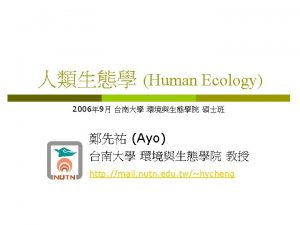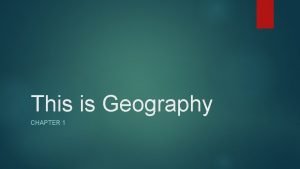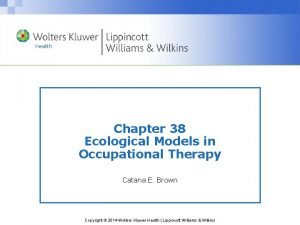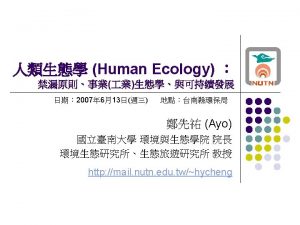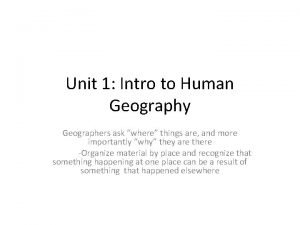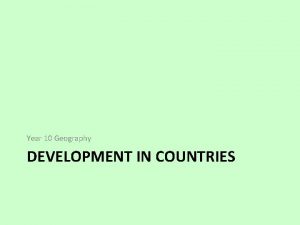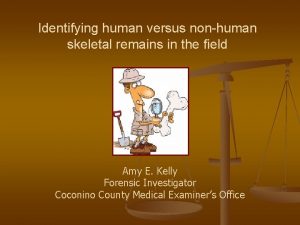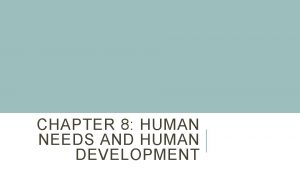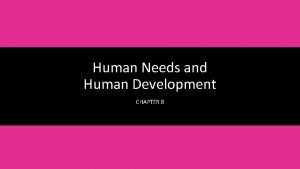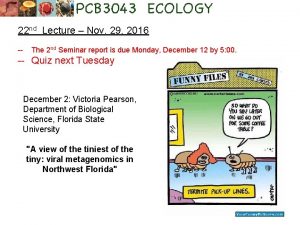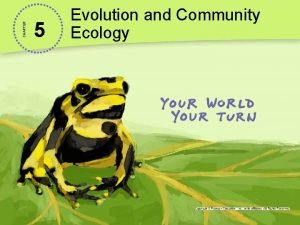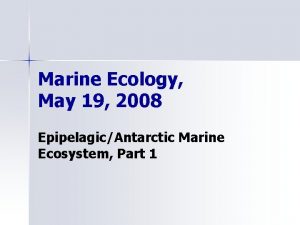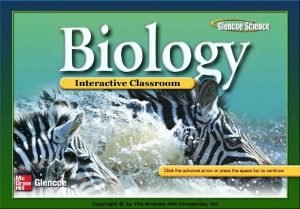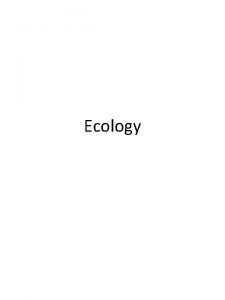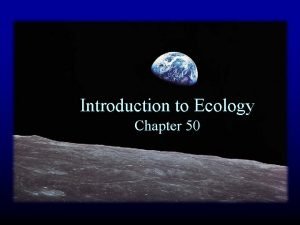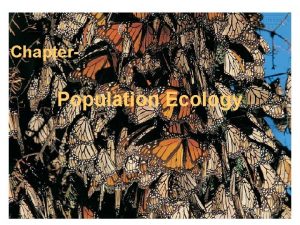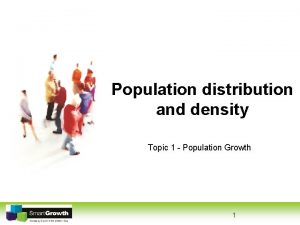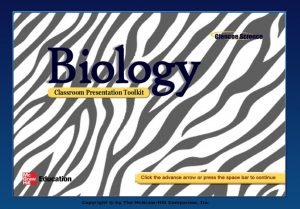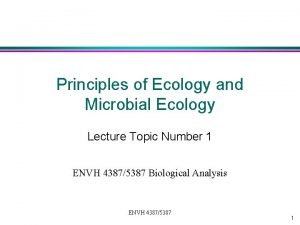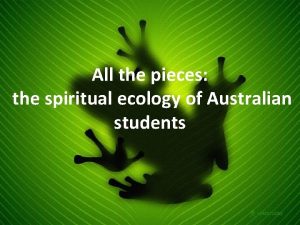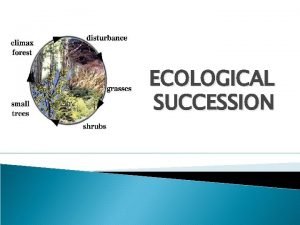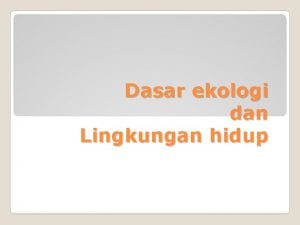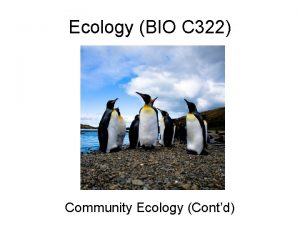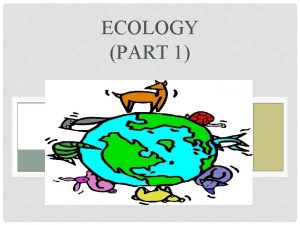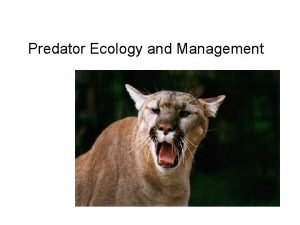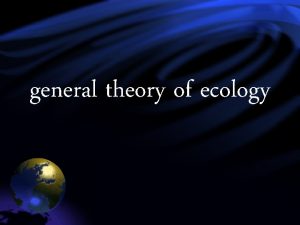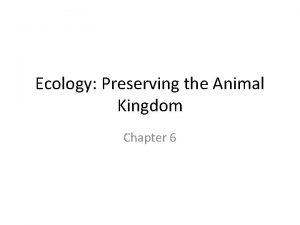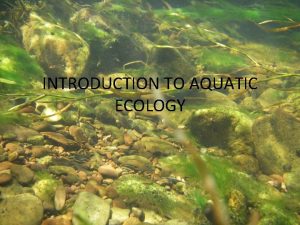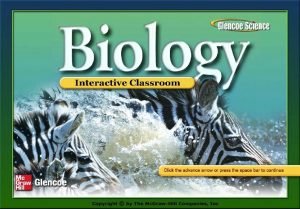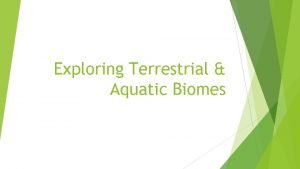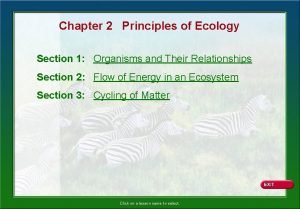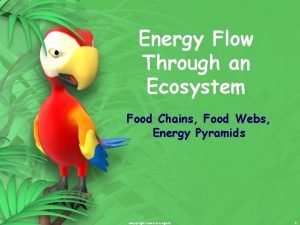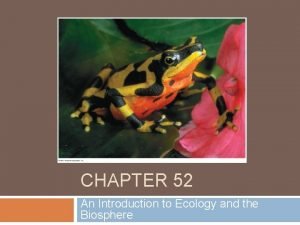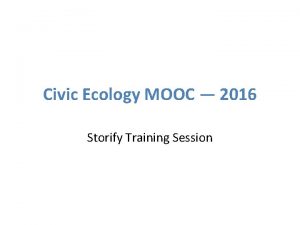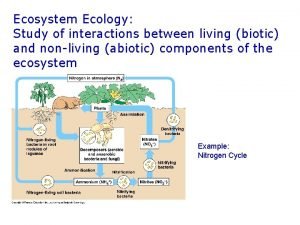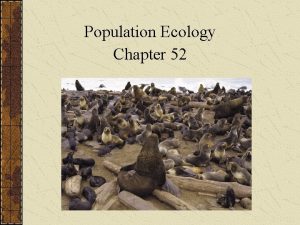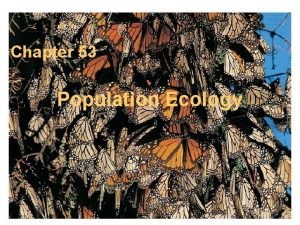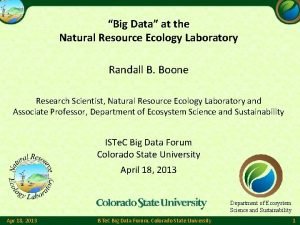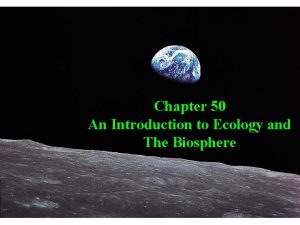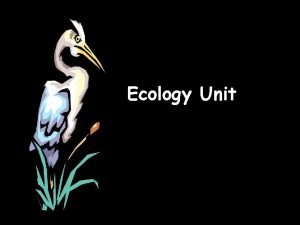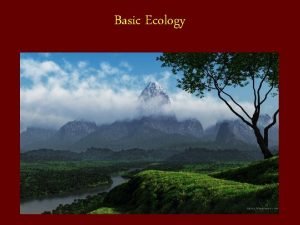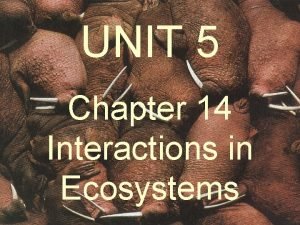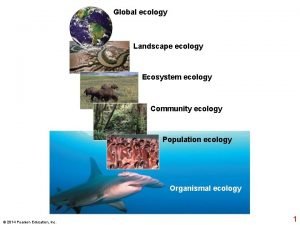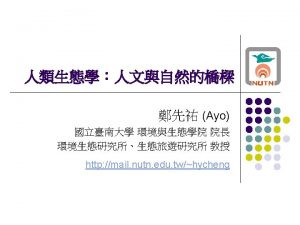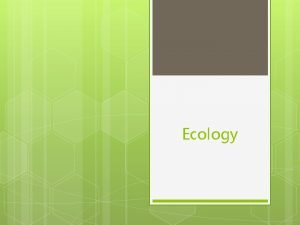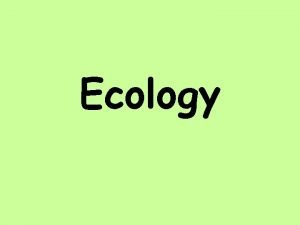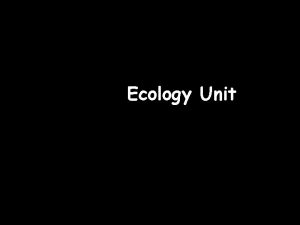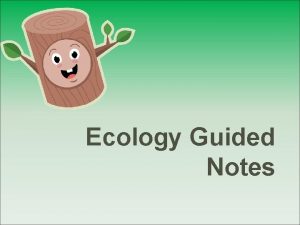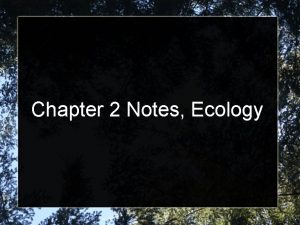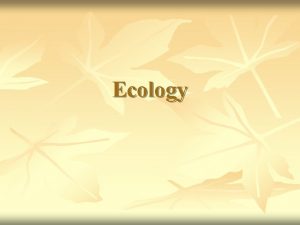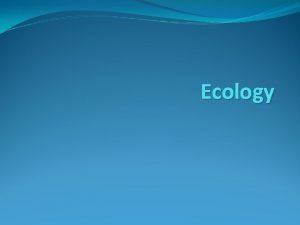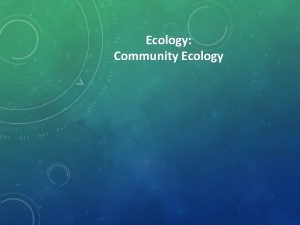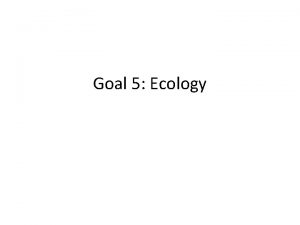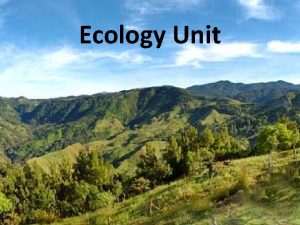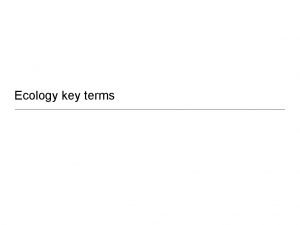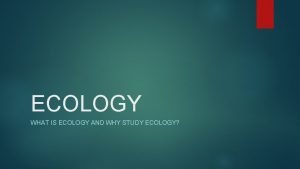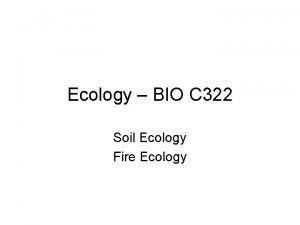What is Human Ecology l Human ecology is
















































- Slides: 48





What is Human Ecology? l Human ecology is about relationships between people and their environment(人與環境的關係). l In human ecology the environment (環境) is perceived as an ecosystem (生態體系). l 生態學 →人類生態學 (Human Ecology) (1910 s) l 人類生態學 l l = 自然生態 與 人文社會 的介面 (interface) = 自然生態 + 人文社會 (文化、政治、經濟、產業、社會 ) 5


摘取自:Marten. G. G. 2001. Human Ecology: Basic concepts for sustainable development. Earthscan pub. Ltd. 人類活動(human activities) Social System 知識 技術 人口 Ecosystem 能 量 、 物 質 與 資 訊 物質循環 (nutrient cycles) 能量循流 (energy flow) 社會組織 價值 Ecological services 7

摘取自:Marten. G. G. 2001. Human Ecology: Basic concepts for sustainable development. Earthscan pub. Ltd. Drift net story (流刺網的故事) Ecosystem Social System 食物 魚類 漁撈 技術 漁民 鳥類 聯合國 政府 民眾 資訊 海豚和海狗 保育團體 Fig. 4. Chain of effects through ecosystem and social system (commercial fishing in the ocean) 8

生態科學(Ecosciences) 的發展史 (一) l l l l 1970 s Conservation + Landscape + Restoration(復育) 1960 s Ecology 才逐漸被認為是重要的「科學」。 1950 s 各自發展屬於自己領域的「人類生態學」。 1940 s Social ecology + Cultural ecology 1930 s 1920 s 生態學的理論基礎 1910 s Animal Ecology + Human Ecology (人類生態學 ) l 1900 s Ecology 成為「生物學」中三大部之一。 l 1866 Haeckel, Ernst : 第一個使用 Ecology 9

生態科學(Ecosciences) 的發展史 (二) l l 2000 s Business Ecology + Information Ecology + Knowledge Ecology + 大學系所(doctoral degree) 1990 s Journal of Industrial Ecology + Ecoefficiency l 1980 s Eco-Industrial park + Deep Ecology + Spiritual Ecology + Radical ecology + Ecoethics l 1970 s Industrial Ecology + Conservation + Landscape + Restoration (復育) + EIA l 1960 s Ecology 才逐漸被認為是重要的「科學」。 10

人類生態學 (Human Ecology) 自然生態與人文社會的介面(interface) l l 基進生態學 (Radical Ecology) 應用生態學 (Applied Ecology) l l l 保育生物學 (Conservation Biology) 復育生態學 (Restoration Ecology) 地景生態學 (Landscape Ecology) 生態旅遊 (Ecotourism) 事業生態學 (Business Ecology) l l l 業生態學 (Industrial Ecology) 資訊生態學 (Information Ecology) 知識生態學 (Knowledge Ecology) 11

Human ecology could help to 1. Anticipate the long-range environmental consequences of human actions (預測長期影響) 2. Avoid disastrous surprises from the environment (避免環境災難) 3. Generate ideas for dealing with environmental problems (化解環境問題之道) 4. Maintain a livable and sustainable relationship with the environment. (維持可持續的關係) 12

2 事業、社會、與環境的變遷(歷史背景) 污染 (成本外溢) Fig. 5 a. Four organizational models: Changing relationships among business, society and environment. 摘取自:Abe, J. M. , P. E. Dempsey, and D. A. Bassett (1998) Business Ecology, giving your organization the natural edge. Butterworth-Heinemann. 13 13

污染者付費 輸出的管制 Fig. 5 b. Four organizational models: Changing relationships among business, society and environment. 14 14

生產效率的提昇 輸入的管理 Fig. 5 c. Four organizational models: Changing relationships among business, society and environment. 15 15

生產系統 Post-1990 圖 6. 生產系統管理必要回歸 原點(向後轉)。 Odum, E. P. (1997) Ecology: A bridge between science and society. Sinauer 16 16 Associates, Inc.


保育生物學的特質 (pervasive) 1. A discipline responding to an immense crisis. (無限的危機) 2. A multidisciplinary science 3. An inexact science (不精確的科學) l Precautionary principle (禁漏原則) 4. A value-laden science (含有價值的科學) 5. A science with an evolutionary time scale 6. A science of eternal vigilance (無休止的警覺 性) 18




3 事業 生態學 Abe, J. M. , P. E. Dempsey, and D. A. Bassett (1998) Business Ecology, giving your organization the natural edge. Butterworth. Heinemann. 22






Industry’s sustainability learning process l l l Before 1970 s: unprepared (none) 1970 s: 1 st era: compliance (承諾): reactive 1980 s: 2 nd era: beyond compliance: anticipatory(事 先預防):regulatory standards 1990 s: 3 rd era: eco-efficiency (生態效率): profit center approach 2000 s: 4 th era: sustainable development (可持續發 展): high integration (explicit mainstreaming of environmental goals 業生態長(師):可持續的 作機會 摘取自:Nattrass, B. and M. Altomare (1999) The natural step for business: wealth, ecology and the evolutionary corporation. New Society Publishers. (p. 16, Fig. 2. 1) 28 28

Industrial Ecology ( 業生態學 ) l Industrial Ecology is a dynamic systems-based framework that enables management of human activity on a sustainable basis(可持續的基礎) by: 1. Minimizing energy and materials usage; (能量與物質的 耗用最低) 2. Ensuring acceptable quality of life for people; (確保生活 的品質) 3. Minimizing the ecological impact of human activity to levels natural systems can sustain(對自然體系的衝擊最低 ) 4. Conserving and restoring ecosystem health and maintaining biodiversity; (生物多樣性) 5. Maintaining the economic viability (維持經濟活力)of systems for industry, trade and commerce. 29 29

The Industrial Ecology approach 1. application of systems science (應用系統科 學) to industrial systems, 2. defining the system boundary to incorporate the natural world(自然世界), and 3. seeking to optimize(最佳化) that system. 業生態師 (長) 30

Industrial Ecology ( 業生態學) l 學術界 l NTNU in Trondheim (Norway) l l Industrial ecology, a degree program at both the undergraduate and Ph. D. research levels. Initiated a degree program in 2001 Yale University (USA), Forestry and Environmental Management l University of Troyes (France) l The Mount Royal College in Alberta (Canada) l 31



生物多樣性保育的價值觀 l conserve biodiversity (保育生物多樣性) = Anthropocentric instrumental values + nonanthropocentric intrinsic value Figure 10. Norton’s convergence hypothesis 34 34

Burden of proof (舉證責任) l When biodiversity is only instrumentally valuable l l When biodiversity is intrinsically as well as instrumentally valuable l l l Burden of proof 是在 conservationists Burden of proof 是在 developers 禁漏原則 (precautionary principle) 價值 → 選擇 → 決策 → 政策 → 結果 35

information technology and public participation (資訊技術與公眾參予) l l l 「資訊生態學」 :NGO recommendations for earth summit - 1997. 04 「資訊生態學」 、公眾參予與全球協定:for un commission on social development - 1998. 02 建構「資訊生態學」的學程:partnership, informatics and participation documents as visiting scholar at development planning unit, university college London - 1998 -1999 運用網路,作為組織的 具:presentation at NGO annual conference - 1999. 09 轉型至基於知識的經濟:in preparation for the international conference on financing for development - 2000. 12 36 36

information ecology and sustainability (可持續性) l Agenda 21 (21世紀議程) - from the 1992 earth summit at rio de janeiro (里約熱內盧) 1. information, data and communication (資訊、數 據與溝通) 2. access, participate and participation (使用、參予 與分享) 3. educate, education and aware (教導、教育與意 識) 資訊生態師 (長) 37


Knowledge Ecology l Yogesh Malhotra (Syracuse University, School of Management, USA) (2002) l l We extend the information ecology(資訊生態學) framework to a framework of knowledge ecology ( 知識生態學). The knowledge ecology of organizational systems goes beyond the emphasis on information, to account for action(行動), performance(表現) and adaptation (適應) of self-regulatory systems (自我 調控的體系). 知識生態師 (長) 39






6 l 問題與討論 Ayo 台南 NUTN 站 http: //mail. nutn. edu. tw/~hycheng E-mail: Japalura@hotmail. com 45



多元文化和諧的理想世界 l. Ayo 台南站 http: //mail. nutn. edu. tw/~hycheng l. E-mail : Japalura@hotmail. com 48
 P what
P what Cultural ecology ap human geography
Cultural ecology ap human geography Ehp occupational therapy
Ehp occupational therapy Human ecology
Human ecology Distortion
Distortion Human development index definition ap human geography
Human development index definition ap human geography Human vs non human bones
Human vs non human bones Human and non human nouns
Human and non human nouns Human needs and human development chapter 8
Human needs and human development chapter 8 Chapter 8 human needs and human development
Chapter 8 human needs and human development Ecosystem ecology
Ecosystem ecology Chapter 5 evolution and community ecology
Chapter 5 evolution and community ecology Marine ecology
Marine ecology Section 1 population dynamics answer key
Section 1 population dynamics answer key Lifespan corn snake
Lifespan corn snake Tropical grassland
Tropical grassland Objective of ecology
Objective of ecology Logistic model of population growth
Logistic model of population growth Population distribution
Population distribution What does ecology mean in greek
What does ecology mean in greek Section 1 population dynamics
Section 1 population dynamics Ecology deals with
Ecology deals with 321 riq
321 riq Pyramids of biomass
Pyramids of biomass Progressive succession examples
Progressive succession examples Oikos meaning in ecology
Oikos meaning in ecology Neutralism in biology
Neutralism in biology Marine geospatial ecology tools
Marine geospatial ecology tools Levels of organization ecosystem
Levels of organization ecosystem Predator ecology
Predator ecology Odum definition of ecology
Odum definition of ecology Ecology preserving the animal kingdom
Ecology preserving the animal kingdom Aquatic ecology definition
Aquatic ecology definition Chapter 2 principles of ecology answer key
Chapter 2 principles of ecology answer key Organismal ecology
Organismal ecology Biomes title page
Biomes title page Principles of ecology section 2 flow of energy
Principles of ecology section 2 flow of energy Food chain in garden ecosystem
Food chain in garden ecosystem Objectives of ecology
Objectives of ecology Chaparral climograph
Chaparral climograph Mooc ecology
Mooc ecology Ecology
Ecology Logistic growth equation population ecology
Logistic growth equation population ecology Chapter 53 population ecology
Chapter 53 population ecology Natural resource ecology laboratory
Natural resource ecology laboratory Intro to ecology
Intro to ecology Ecology unit review
Ecology unit review Four levels of ecology
Four levels of ecology Which of the following tells you population density
Which of the following tells you population density
